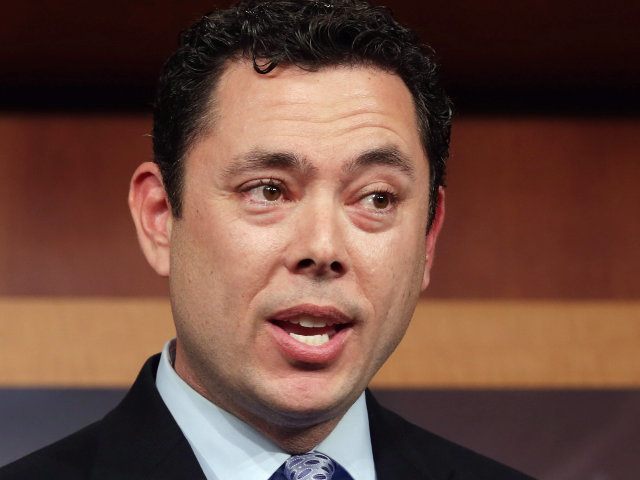House Oversight and Government Reform committee chairman Rep. Jason Chaffetz (R-UT), in his official announcement made on Sunday that he’s running for Speaker of the House, implicitly dinged House Majority Leader Rep. Kevin McCarthy (R-CA) for being unable to communicate effectively.
Chaffetz’s announcement—in a public statement and also a private email to members of the House, since obtained by Breitbart News—draws a clear contrast with the version of McCarthy on display to the public for the last week plus since outgoing House Speaker John Boehner announced his forthcoming resignation.
“I am running for Speaker of the House of Representatives because I want to lead the way on tackling the toughest issues facing the United States of America,” Chaffetz said in his public statement. “The American people have entrusted Republicans with the largest majority since the 1920s, but with that majority comes a responsibility to get the job done that we were elected to do.
“I came to Congress to help fix problems, and as Speaker I will fight every day to make that happen. I look forward to sharing my vision for the Speakership with my colleagues and the American people.”
That public statement is fairly innocuous, but his email to members made clear a huge focus of his candidacy for the Speakership is based on being able to effectively communicate a GOP message.
“We need a Speaker who is an effective communicator,” Chaffetz wrote in the email to his colleagues. “Equally important, we need a body of Representatives who are supported by leadership for the work they were elected to do.
“We need to move away from a top-down process and encourage our Conference to roll up our sleeves and get after the work needed to fix the country. That means allowing the important work done in our committees to move forward. That also means allowing amendments to be offered.
“And for the next Speaker of the House, it means leading the process forward and exerting every possible ounce of pressure to push the Senate to do their job and take votes, too.”
In the email, Chaffetz also had several bullet points laying out how he would be an effective communicator as Speaker.
Chaffetz said he would be a Speaker who would “do a great job of communicating a positive and strong message of hope and opportunity for our country,” and he would “bridge the current divide within our Conference so we can focus on producing results,” while sticking up “for our core conservative principles: accountability, fiscal discipline, limited government and a strong national defense” and sharing “the message that Republicans are willing to take on and solve the tough issues facing our country.”
By stressing the need for clear communication from a potential next Speaker, Chaffetz is drawing a contrast between himself and McCarthy after a significant incident this past week. Appearing on Sean Hannity’s television program last week, McCarthy screwed up comments about the House Benghazi Select Committee.
Hannity had been pressing McCarthy for some kind of evidence the House GOP majority in the past few years had achieved something.
“Everybody thought Hillary Clinton was unbeatable, right?” McCarthy said in the interview—an interview in which he struggled to communicate clearly throughout the entire appearance. “But we put together a Benghazi special committee, a select committee. What are her numbers today? Her numbers are dropping. Why? Because she’s untrustable. But no one would have known any of that had happened had we not fought.”
Republicans and Democrats seized on McCarthy’s comments—including Chaffetz—pushing him to apologize for suggesting that the Benghazi Select Committee was politically motivated. McCarthy later tried to clarify them.
Chaffetz, in his email to members of the House GOP conference, also promised that if he is elected Speaker he will “restore regular order so that the work of the committees is brought to the floor” and “engage in meaningful process reform to maximize Member input and participation” as well as “respect and value the contributions of our entire Conference’s.”
“We have a great team and we need everyone’s inspiration, enthusiasm and input to succeed,” Chaffetz wrote.
Chaffetz, in the email, also revealed that it’s unlikely in his opinion McCarthy would ever win the election for the Speakership.
“The reality is there are already more than 50 Republicans who have indicated they cannot or will not vote for a current member of our leadership team to be the Speaker,” he wrote. “Given that reality, uniting behind a candidate that can get to the 218 votes necessary to win the Speakership is critically important. I am confident I can bridge this divide and work effectively together with all members of our Conference.”
If that significant number of members—50, as Chaffetz says, and there are more conservatives standing together by others’ estimates—hold together as a voting bloc, they have enough votes to deny anyone the Speakership. That means they could deny McCarthy the Speakership—or they could deny it to Chaffetz, or say Rep. Daniel Webster (R-FL), the only other Republican running.
On this coming Tuesday evening, as many as 80 House Conservatives spread across four separate groups—the House Freedom Caucus, the Conservative Opportunity Society, the House Tea Party Caucus, and the House Liberty Caucus—will band together to vet the various candidates for Speaker of the House. McCarthy, Webster and presumably Chaffetz will be there from 7:30 p.m. to 9 p.m. for the members-only meeting.

COMMENTS
Please let us know if you're having issues with commenting.